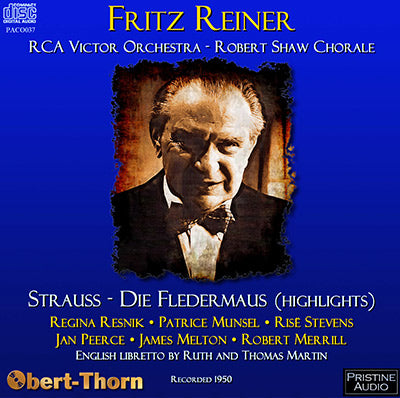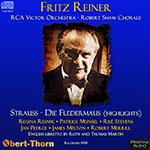
This album is included in the following sets:
This set contains the following albums:
- Producer's Note
- Full Cast Listing
- Cover Art
Reiner's 1950 "Broadway" Fledermaus
Another excellent Obert-Thorn transfer
One of the new productions planned by Rudolf Bing for his first season as general manager of the Metropolitan Opera (1949-50) was an all-star, Broadway-style revival, in English, of Die Fledermaus. Garson Kanin (the playwright of Born Yesterday and screenwriter of Adam’s Rib) was asked to provide a new book and direct, while Howard Dietz (whose musical theater collaborations with composer Arthur Schwartz included Dancing in the Dark and You and the Night and the Music) would furnish the lyrics. Veteran French coloratura Lily Pons was initially discussed for the part of Adele, and Fritz Reiner was engaged to conduct. The whole production was to be recorded by Columbia Records as part of their ongoing series of complete operas featuring Met personnel.
From early on, however, the original plans began to unravel. Reiner feuded with Kanin over some of the latter’s staging ideas, such as having the conductor face the audience during the overture, and having the chorus lying supine during the “Duidu” portion toward the end of the second act where they would be out of the conductor’s sightline. More significantly, and unbeknownst to the Met management, Reiner had recently switched allegiance from Columbia to its rival RCA Victor, which was planning its own Fledermaus highlights album using Met stars under contract to them, to be conducted by Reiner.
After learning of this, Bing maneuvered to replace Reiner with Eugene Ormandy, the Philadelphia Orchestra music director who was a Columbia artist, but who had had limited experience as an opera conductor. Reiner, furious when he heard he had been replaced, happened upon Ormandy in the office of the Met’s musical administrator, and said with his typical dryness, “I hear that you are going to conduct Fledermaus. Do you know the piece?”
Meanwhile, the rest of the cast took shape. Ljuba Welistch, the “Bulgarian bombshell” who had made such a striking impression as Salome under Reiner during the Met’s previous season, would sing Rosalinda. Wagnerian tenor Set Svanholm was an unexpected choice as her husband, Eisenstein. Although Pons had learned the role of Adele, she would sing it only on the Columbia recording. Patrice Munsel was the Adele for the première, and would go on to record the role for RCA, as would the Orlofsky, Rïse Stevens. The production opened on December 20, 1950, and the Columbia recording (reissued on Pristine Audio PACO 030) was begun four days later.
By that time, however, the RCA highlights recording had already been completed for three months. The new Dietz translation being unavailable to the label, a version written by Ruth and Thomas Martin which had been prepared for an NBC television performance during the 1949-50 season was used. Theirs was a fairly straightforward rendering of the Haffner and Genée original, as opposed to Dietz’s much more self-consciously arch reworking. Most of the original numbers were preserved on the nearly hour-long LP, but some had to be limited to a single verse due to timing constraints.
In his essay on the work in Opera on Record, Alan Blyth preferred this highlights collection to the more-complete Columbia recording, finding that “[t]he young Regina Resnik makes a delightfully dizzy Rosalinde, James Melton a lively Eisenstein, Patrice Munsel a spirited Adele” while “Robert Merrill makes much of ‘Brüderlein’, sorry, ‘Brother dear’” and Fritz Reiner conducts the work “with more brio” than Ormandy.
The present transfer was made from the best
portions of several American RCA pressings (plum “shaded dog”, red
“shaded dog” and even 45 rpm discs). Despite the presence of Reiner and
several celebrated singers, RCA has not made this recording available in
any form for nearly half a century. We are happy to rectify that
oversight now.
Mark Obert-Thorn
REINER conducts J. STRAUSS II
Die Fledermaus - Highlights
Original Libretto by Haffner and Genée
after Le Reveillon by Meilhac and Halévy
English libretto by Ruth and Thomas Martin
Rosalinda - Regina Resnik (soprano)
Adele - Patrice Munsel (soprano)
Alfred - Jan Peerce (tenor)
Gabriel von Eisenstein - James Melton (tenor)
Prince Orlofsky - Risë Stevens (mezzo-soprano)
Dr. Falke - Robert Merrill (baritone)
Frank -. Hugh Thompson (baritone)
The Lawyer - Johnny Silver (tenor)
Ida - Paula Lenchner (soprano)
RCA Victor Orchestra
Robert Shaw Chorale (Robert Shaw, director)
Fritz Reiner, conductor
Recorded September 20, 1950 in Manhattan Center, New York City
First issued as RCA Victor LM-1114
Producer and Audio Restoration Engineer: Mark Obert-Thorn
Special thanks to Maynard F. Bertolet for providing source material
MusicWeb International Review
The present CD release of this early recording of Die Fledermaus completely achieves what it set out to do, which was to give a rendition of Strauss’s operetta as a Broadway musical.
Johann Strauss II’s operetta Die Fledermaus
is in my opinion the best of his stage works. The original libretto
was by Carl Haffner and Richard Genée after Le Reveillon
by Henri Meilhac and Ludovic Halévy. The English libretto used
here is by Ruth and Thomas Martin. It’s accomplished musically
and dramatically and the composer clearly demonstrates his artistic
maturity and his talent for melodic, catchy tunes. There are countless
versions of Die Fledermaus on CD, on DVD, and, more recently,
at least one on Blu-ray, some in an English translation; others
in its original German.
The present CD is a transfer from an old 1950 recording of Die Fledermaus,
which Pristine Audio released earlier this year. With the exception of
conductor Fritz Reiner and the RCA Victor Orchestra of which I had heard
and read about, and also famous baritone Robert Merrill, who sings Dr.
Falke, I confess that I had no idea who the other artists were, mainly
because they were all active long before I was born. As, more often than
not, such old recordings are of very poor quality (even after the
transfer to CD) I must admit that I was a bit reluctant even to listen
to the work. It was therefore a pleasant surprise to realise that
although mono, the sound is very clear, clean and that the transfer is
excellent; possibly one of the best I have heard.
In the absence of performance notes or artists’ biographies, I did
some research on the internet to learn about some of the lead singers
and also about the history of the recording. There is some interesting
information regarding the production of this Die Fledermaus for
the Met, provided by producer and audio restoration engineer, Mark
Obert-Thorn, on the CD back cover, which can also be found on the
Pristine Audio website. According to Obert-Thorn, at the time of the
recording, the general manager of the Metropolitan Opera House in New
York, was Rudolf Bing and the season of 1949-50 was his first. He wanted
a new production of Strauss’s famous, popular operetta but he wanted
something different: he had opted for a Broadway-style revival, in
English. And here resides my main issue with this CD. Strauss’s operetta
does lend itself to a Broadway-style staging, due to its catchy tunes,
beautiful melodies and very funny use of comedy techniques, as well as a
witty libretto. Naturally, if it was going to be presented in the
manner of a Broadway musical then it had to be in English. Personally,
however, I do not think that the music harmonises well with an English
libretto, however excellent the translation might be. Ruth and Thomas
Martin who translated the German libretto for this adaptation did an
excellent job and arguably the best ever while trying to remain as
faithful as possible to the German original. Unfortunately, to my mind,
it just does not work so well. There are many parts where this is
noticeable. To me, the most annoying is the final ensemble in Act II, Brüderlein, Schwesterlein, appearing here as “Brother dear, Sister dear”, which loses impact. On the other hand, they did a good job of Trinke liebchen, trinke schnell by translating it as “Drink, my darling, drink to me”, which at least keeps a similar linguistic rhythm to the original.
Language aside - which is only my personal view - the recording is
very pleasant and the performance rather attractive. Fritz Reiner
(1888-1963) proves his insight into the music and leads the RCA Victor
Orchestra into a colourful, vibrant and lively performance of Die Fledermaus
that will have you dance on your seat or sing along while you are
listening to it. Reiner was a very distinguished conductor in his day;
mostly of opera but also of symphonic works. Born in Budapest, Hungary,
he worked closely with Richard Strauss in Dresden and in 1922 went to
the States, where he became an American citizen in 1928, remaining there
to the end of his days. He was said to be a quiet, sober conductor and
his leading of the orchestra was almost imperceptible, which is
particularly interesting when one remembers that Leonard Bernstein was
his most famous student.
Robert Merrill was the only singer I knew and that I had heard
before, mainly through my father’s old recordings of Leoncavallo’s Pagliacci and “Duets and Scenes” (including the celebrated duet from Bizet’s The pearl fishers)
with Swedish tenor Jussi Björling. Merrill sang with a clear, pure but
rich voice; his baritone was resonant but warm; sometimes soft and
delicate; others powerful and often with a velvet quality of tone. Even
though in this CD of Highlights from Die Fledermaus, one does not
hear enough of him in order to appreciate the full colours of his
voice, his appearances are pleasant and effective.
As I did not know the other singers, after listening to this
recording the first time, I went to YouTube, where these days one can
find everything, and I was able to listen to tenor Jan Peerce, who sings
Alfred with grace and easiness, performing other arias from great
operas, as for example Lensky’s aria in Tchaikovsky’s Onegin. He
had a truly great dramatic voice, powerful, expressive and on occasions
with an almost baritone edge to it while reaching the higher notes with
style and elegance. I must also mention Regina Resnik who delivers an
excellent Rosalinda, displaying comical talent and a brilliant coloratura, particularly during the famous Czardas
that she sings with great finesse; James Melton who performs a very
convincing Gabriel von Eisenstein; Patrice Munsel who plays Adele and
possesses a really beautiful crystal clear soprano and last, but
definitely not least, Risë Stevens who delivers a fantastic Prince
Orlofsky in her melting, sensuous mezzo-soprano tone. All of them can be
enjoyed on YouTube in some great performances, which I would recommend,
if, like me, you never had the opportunity of listening to them before.
The present CD release of this early recording of Die Fledermaus
completely achieves what it set out to do, which was to give a
rendition of Strauss’s operetta as a Broadway musical. The sound is of
surprising good quality and if you prefer to listen to it in English
because you wish to enjoy the witty plot in its entirety, then this CD
is definitely for you. However, if like me, you understand German and
you prefer to hear the work sung in the language for which the music was
intended, then this is not the recording for you and you must look for
one of the many excellent versions, available on CD or DVD, which
reproduce the original in all its glorious detail.
Margarida Mota-Bull

